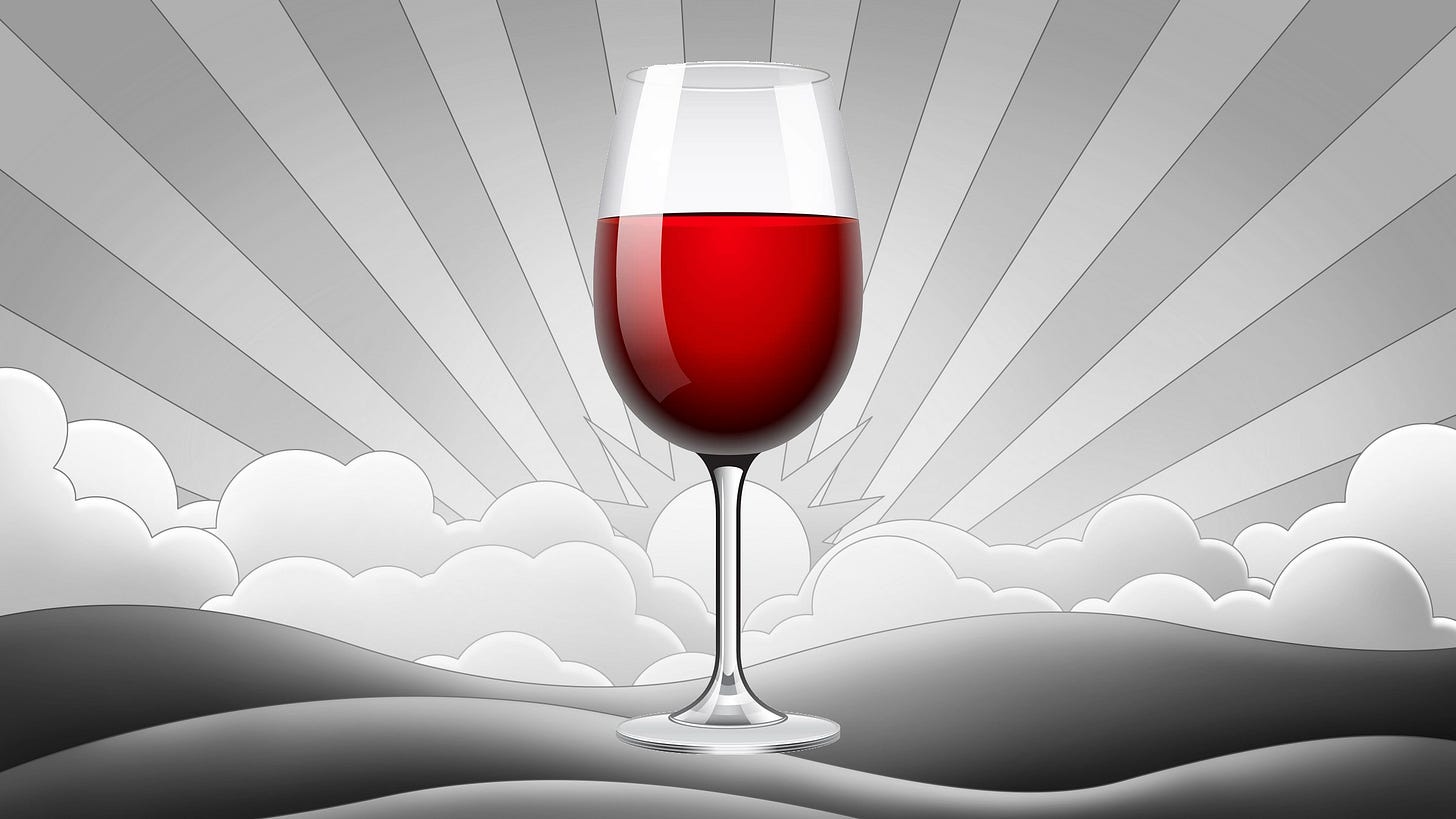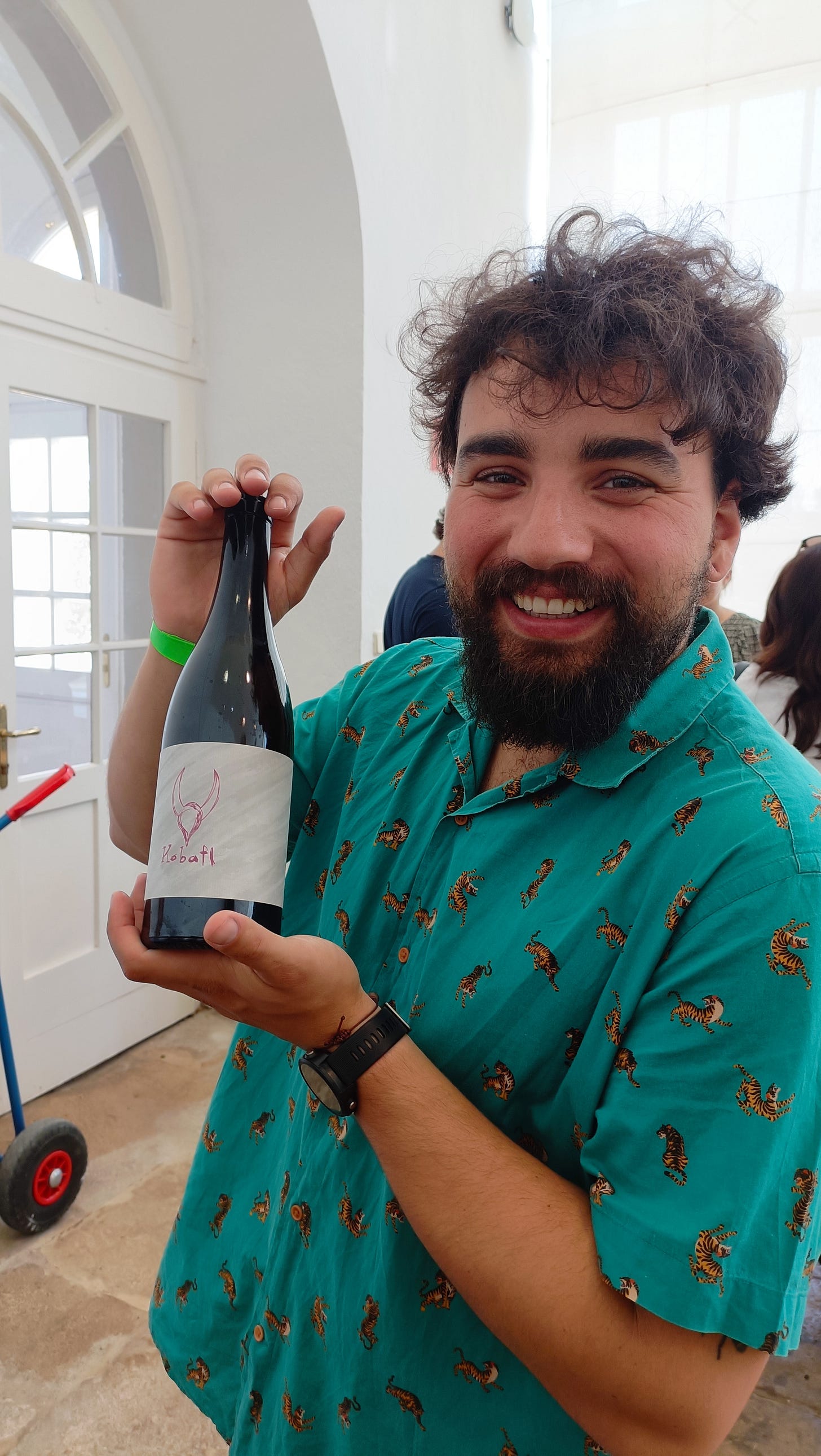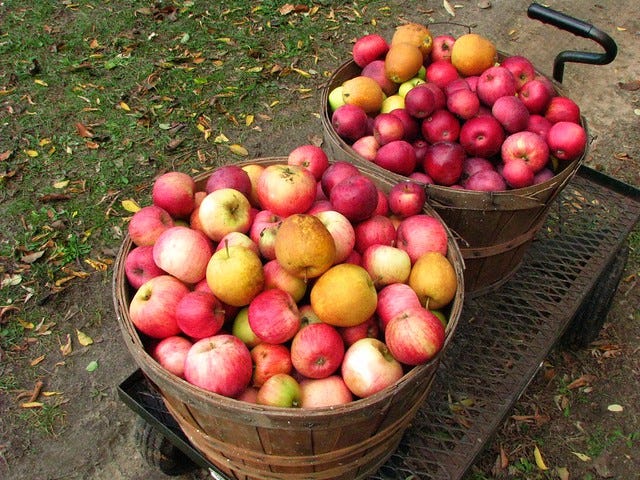Why are we so obsessed with grapes?
Reactions to an mind-blowing podcast about the definition of wine, with thoughts on co-ferments and other non-grape goodness.
Welcome to the first subscriber newsletter from this new iteration of The Morning Claret. Thank you so much for subscribing. It means the world to me. An extra special thank you to those of you who already upgraded to a paid subscription. You make it possible for me to carry on reporting and writing quality independent content.
In case you missed it, I published a companion piece to last year’s Noble Rot article a few days ago. You’ll need to be a paid subscriber to read it. Or you can try a cheeky 7-day free trial if you’re not quite ready to support The Morning Claret.
My Definition of Natural Wine
"Last year’s piece Natural Wine Shouldn’t be a Style clearly struck a nerve with many readers. But if that piece lamented what the term natural wine has come to signify, here I want to outline what it means for me. "
If you do just one thing today, I highly recommend taking 20 minutes to listen to this short podcast from Adam Huss (Beyond Organic Wine Podcast). It simply blew my mind.
I’ll summarise. Adam has been podcasting for years about cutting edge ecological practices in wine growing. Whether it’s no-spray practitioners, wild vines in Turkey or growers who specialise in PIWIs, he delves deep and ventures way off-piste.
This latest short episode is, for me, the essence of Adam’s work to date, distilled into one brilliantly argued, concise manifesto.
Adam asks why the industry is so obsessed with wine being made only from grapes - and only Vitis vinifera grapes at that. “Why do I care about redefining wine?” he says. “One really important reason is ecological. Because of the narrow definition of wine, wine has become a global monoculture. 10 vinifera grapes account for over 40% of what we have defined as ‘wine.’”
He asks how winemaking based purely around vinfera grapes took hold so fast in his home state California. History paints a pretty sordid tale of exploitation and opportunism. If you thought it was all about terroir and tradition, think again.
And why are the wine industry, wine media and particularly wine classification systems so resistant to the suggestion that ‘real’ wine could include blends with other fruits, let alone American non-vinifera varietals like Isabella?
I loved his aside that the modern wine category is a massive hotch-potch of diverse styles. “We consider Champagne and Sherry to be wines, We think of Madeira and Sancerre as wine, We think of Tokaij and Tocai Friulano, Graves and Sauternes as wine. All of these beverages are very different.” he says. “So why do we quibble about letting cider be a wine. Most ciders I’ve tasted have a lot more in common with a Prosecco than a Port does.”
Go listen to the rest. Meanwhile, Adam’s challenge to think differently has kept my brain busy all week.
Uh Huh?
It’s true that the classical wine world doesn’t take kindly to anything messing with its precious PDO approved Vitis vinifera. Most wine critics turn their noses up if they’re poured something like an Uhudler - a curiosity from Southern Burgenland, where growers have an exemption to use American varieties such as Isabella, Noah or Clinton, which have been planted in the region for a century. Austria expert Stephen Brook gives a typical response in his book The Wines of Austria, saying that he personally finds Uhudler “revolting”. I don’t want to single him out - this view is typical.
When I wrote about the growth of interest in hybrids (AKA PIWIs) a few years back, many of the industry experts I talked to poured scorn on the varieties. They insisted that these new crossings will never be able to make wines of the same quality as Chardonnay in Burgundy, or Cabernet in the Medoc.
But winemakers are catching up fast. And strangely enough, the sector where I see the most enthusiastic adoption of new hybrids is natural wine. Anyone who currently hates on varieties such as Solaris, Souvignier Gris or Bronner would be well advised to try the wines of Thomas Niedermayr in the Alto Adige, Ploder-Rosenberg or Michael Kobatl in Styria. All three growers focus almost entirely on hybrids, and all three produce sensational wines.
I hope Adam has tried some of the accomplished non-vinifera based wines coming out of Japan. Varieties such as Delaware, Neomuscat and Muscat Bailey A are plentiful, in part because they do well in some of Japan’s extremely wet and cold climates. Both winemakers and drinkers take them seriously too.
Beyond grapes
As Adam suggests, let’s broaden this beyond grapes. While I think he’s absolute correct in pointing out that the industry doesn’t take anything non-grape based seriously, let’s not forget that Europe harbours plenty of delicious fermented traditions that wouldn’t meet with the EU’s definition of wine. Head to central Italy, and specifically the area around the city of Ancona in Marche and you’ll find a juicy sweet delight named Vino di Vitiole. It’s made with sour cherries that are macerated in grape must, which is then fermented and further fermented with the addition of more sugar. Maybe it’s not d’Yquem, but it’s pretty damn delicious. Cantina Moroder makes a memorable version. But, how strange: you won’t find this tradition listed in the Oxford Companion to Wine, and I couldn’t find any information at all in English.
France and the UK both have strong traditions of fermenting other fruits, particularly apples and pears. We just don’t call them wine. But take a look at what’s happened in Brittany and Normandy: there are now IGP classifications for cider, just as same as there are for ‘real’ wine. And these can be very serious beverages, frequently vintage dated, treated and priced on a similar level to artisanal wine. I’ve enjoyed bone-dry poiré that has no less focus and elegance than your favourite Chablis. Top flight examples are often made along similar lines to natural wines - wild fermentations, no added sulphites etc. Tillingham wines in the UK make a qvevri fermented cider, fermented on Pinot Noir skins. I could go on.
You might have a spotted a theme developing in that last paragraph. There is more innovation and acceptance of mixed ferments or non-grape based ferments amongst natural wine growers. Go to most natural wine fairs and there will be a few exhibitors who don’t fit into the mainstream wine category. You might be tasting with Utopia, from Moravia, who produce naturally fermented ciders from their own orchards. Or Sweden’s Fruktstereo, who make fermented fruit beverages with no additives. The natural wine community has embraced all of these and more.
Hop to it
I know of at least three natural wine growers (a clumsy phrase, but it’ll have to do for now) who all make hop-aromatised wines. Franz Weninger’s A Glimmer of Hops was conceived when he noticed some wild hops growing on the edge of his vineyards in Mittelburgenland, Austria. Julie-Ann Hoch, partner of Christoph Hoch in Kamptal, Austria makes a summery hopped pet-nat that drinks like the bastard sun of an IPA and an elderflower champagne. In the Douro, Quinta da Tourais’s Lilipop Hops Edition is a punchy, aromatic delight based around a typical Douro white blend.
None of these winey beverages are regarded as anything more than curiosities by most of the wine world, and I’m not betting strong odds on them getting a review in The Wine Advocate or Decanter any time soon. Are they any less interesting or worthy of critical attention? Most of the above are made by growers who specifically want to use what grows locally. They fit absolutely with the idea of terroir. If you still believe in terroir (spoiler: future article on the way).
While the wine industry contemplates its navel, there are signs that the rest of the world already moved on. My colleagues Felicity Carter and Erica Duecy AKA Business of Drinks recently interviewed drinks analyst Bryan Roth about the wider world of alcoholic beverages. His big headline? “No one cares about your base fermentable.”
Duecy and Carter elaborated: “There’s rapid innovation taking place, driven by consumers who are moving from defining themselves by their choice of beverage — “I am a beer, wine or spirits drinker” — to “I’m after something that will taste good.”
So wake up wine world. Adam Huss’s ecological concerns must be front and centre, but additionally, if wine persists in defining itself as a walled garden, it may find that no-one wants to open the gate any more.
I would love to read your comments on Adam’s podcast, or your views on all the delicious drinks that sit on the edge of the wine category. Do you take them seriously or do you think they have no place in the world of serious wine?
Many thanks to Ryan Opaz who brought Adam Huss’s work to my attention








I love both the podcast and your article, Simon. Just recently in the Dutch magazine Wijn en Wijngaard, I published an historical view on grape ales: the blend of beer and something grapey. To me, this is a going back to the origin of fermented beverages, wherein grains, grapes, other fruits, botanicals, herbs, where all mixed to get a good drink. The works of Patrick Govern are my reference for this.
I was talking to Tim Phillips from Charlie Herring wines in Hampshire and he said that if you're an English winemaker and you're not making cider then you are missing a trick. He compared the thousands of hours of attention vines need with the minutes of attention an apple tree needs.